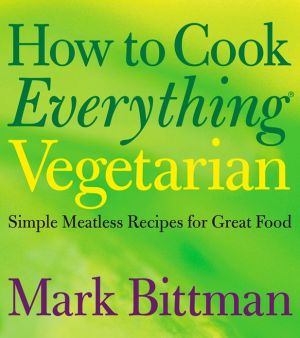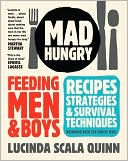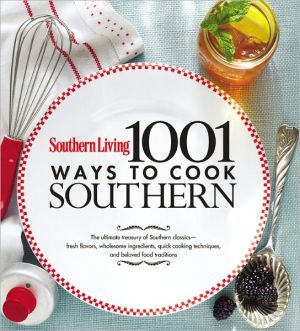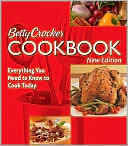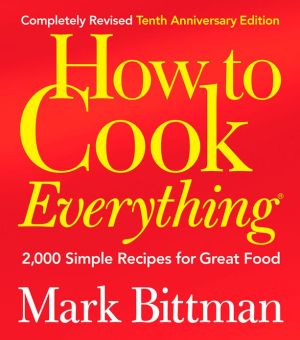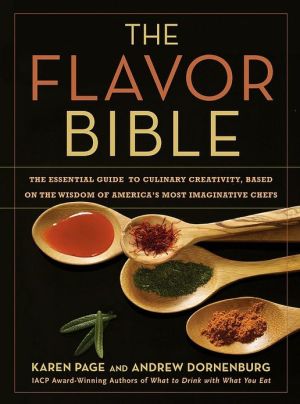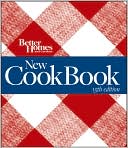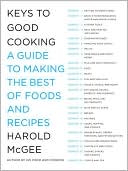How to Cook Everything Vegetarian: Simple Meatless Recipes for Great Food
The ultimate one-stop vegetarian cookbook-from the author of the classic How to Cook Everything. Hailed as "a more hip Joy of Cooking" by the Washington Post, Mark Bittman's award-winning book How to Cook Everything has become the bible for a new generation of home cooks, and the series has more than 1 million copies in print. Now, with How to Cook Everything: Vegetarian, Bittman has written the definitive guide to meatless meals-a book that will appeal to everyone who wants to cook simple...
Search in google:
Known for simple recipes, great-tasting food, and straight-shooting advice, Mark Bittman has inspired a whole new generation of cooks. Now, with How to Cook Everything Vegetarian, he delivers the ultimate guide to meatless meals. Like his bestselling, award-winning How to Cook Everything, this masterwork is comprehensive, authoritative, contemporary, and approachable—a book that sets a new standard and finally makes vegetarian food accessible to every home cook. Written not only for vegetarians but for those who—like Bittman himself—are omnivores striving for a more health-conscious, planet-friendly diet, it provides everything you need to build meals around delicious meatless recipes. How to Cook Everything Vegetarian is packed with more than 2,000 recipes and variations—an unprecedented number of ways for you to enjoy satisfying meals without missing the meat. To name just a few of the great dishes you'll find inside: Cherry Tomato Salad with Soy Sauce, Rich Zucchini Soup, Pan-Grilled Corn with Chile, Eggplant-Tofu Stir-Fry, Pasta with Caramelized Onions, Lentils and Potatoes with Curry, and Breakfast Polenta "Pizza." And because Bittman is a self-taught home cook, not a restaurant chef, his recipes are refreshingly straightforward, resolutely unfussy, and unfailingly delicious—dishes that you can prepare with ease and serve with confidence. The book covers the whole spectrum of meatless cooking: salads, soups, eggs and dairy, vegetables and fruit, pasta, grains, legumes, tofu, breads, condiments, and desserts. To make choosing recipes easier, special icons identify those recipes that can be made in 30 minutes or less,those that can be made in advance, and those that are vegan. And throughout the book, handy, creative charts, sidebars, and lists give you brilliant ideas and tips for everything from spicing up tomato sauce to grilling vegetables. Illustrated with 250 how-to illustrations and brimming with Bittman's familiar, no-nonsense advice on everything from cooking an omelet to preparing pad Thai, How to Cook Everything Vegetarian is the first vegetarian cookbook that everybody will want. Publishers Weekly Marking how mainstream vegetarian cooking has become, the next must-have for the vegetarian cook's shelf comes from New York Times"Minimalist" chef Bittman, an avowed meat eater. And that ensures one of this massive compendium's many attractions: a wealth of recipes that don't scream "vegetarian" and plentiful guidelines to make cooking vegetarian as intuitive as cooking with meat. Like his now classic How to Cook Everything, this book opens with terrifically useful, straightforward discussions of essential ingredients, appliances and techniques, which Bittman builds on throughout in to-the-point sidebars and illustrated boxes. The recipes flow thick and fast in his theme-and-variations style: Green Tea with Udon Noodles is followed by concise instructions for making it 17 different ways, while Coconut Rice gets five additional takes and Kidney Beans with Apples and Sherry four; other lists (six Great Spreads for Bruschetta or Crostini, 10 Garnishes for Pozole with Mole) abound and inspire. New vegetarians and vegetarians cooking for omnivores will appreciate Bittman's avoidance of faux meat products in favor of flavorful high-protein dishes like Braised Tofu in Caramel Sauce and Bechamel Burgers with Nuts. Even owners of the original book will find much new to savor while benefiting from Bittman's remarkable ability to teach foundational skills and encourage innovation with them, which will help even longtime vegetarians freshen their repertory. (Oct.)Copyright 2007 Reed Business Information
Acknowledgments. Introduction. Ingredients. Equipment. Techniques. Salads. Soups. Eggs, Dairy, and Cheese. Produce: Vegetables and Fruits. Pasta, Noodles, and Dumplings. Grains. Legumes. Tofu, Vegetable Burgers, and Other High-Protein Foods. Breads, Pizzas, Sandwiches, and Wraps. Sauces, Condiments, Herbs, and Spices. Desserts. Menus. Recipes by Icon. Sources. List of Illustrations. Index.
\ From the Publisher"Today a good general vegetarian cookbook ought to be de rigueur in any kitchen.... Mr. Bittman works hard to concentrate on accessible, nonesoteric cooking while introducing a big though nonprogrammatic range of international possibilities". (Online New York Times Book Review, December 12, 2007)\ Marking how mainstream vegetarian cooking has become, the next must-have for the vegetarian cook’s shelf comes from New York Times "Minimalist" chef Bittman, an avowed meat eater. And that ensures one of this massive compendium’s many attractions: a wealth of recipes that don’t scream "vegetarian" and plentiful guidelines to make cooking vegetarian as intuitive as cooking with meat. Like his now classic How to Cook Everything, this book opens with terrifically useful, straightforward discussions of essential ingredients, appliances and techniques, which Bittman builds on throughout in to-the-point sidebars and illustrated boxes. The recipes flow thick and fast in his theme-and-variations style: Green Tea with Udon Noodles is followed by concise instructions for making it 17 different ways, while Coconut Rice gets five additional takes and Kidney Beans with Apples and Sherry four; other lists (six Great Spreads for Bruschetta or Crostini, 10 Garnishes for Pozole with Mole) abound and inspire. New vegetarians and vegetarians cooking for omnivores will appreciate Bittman’s avoidance of faux meat products in favor of flavorful high-protein dishes like Braised Tofu in Caramel Sauce and Bechamel Burgers with Nuts. Even owners of the original book will find much new to savor while benefiting from Bittman’s remarkable ability to teach foundational skills and encourage innovation with them, which will help even longtime vegetarians freshen their repertory. (Oct.)(Publishers Weekly, June 18, 2007)\ \ \ \ \ \ Publishers WeeklyMarking how mainstream vegetarian cooking has become, the next must-have for the vegetarian cook's shelf comes from New York Times"Minimalist" chef Bittman, an avowed meat eater. And that ensures one of this massive compendium's many attractions: a wealth of recipes that don't scream "vegetarian" and plentiful guidelines to make cooking vegetarian as intuitive as cooking with meat. Like his now classic How to Cook Everything, this book opens with terrifically useful, straightforward discussions of essential ingredients, appliances and techniques, which Bittman builds on throughout in to-the-point sidebars and illustrated boxes. The recipes flow thick and fast in his theme-and-variations style: Green Tea with Udon Noodles is followed by concise instructions for making it 17 different ways, while Coconut Rice gets five additional takes and Kidney Beans with Apples and Sherry four; other lists (six Great Spreads for Bruschetta or Crostini, 10 Garnishes for Pozole with Mole) abound and inspire. New vegetarians and vegetarians cooking for omnivores will appreciate Bittman's avoidance of faux meat products in favor of flavorful high-protein dishes like Braised Tofu in Caramel Sauce and Bechamel Burgers with Nuts. Even owners of the original book will find much new to savor while benefiting from Bittman's remarkable ability to teach foundational skills and encourage innovation with them, which will help even longtime vegetarians freshen their repertory. (Oct.)\ Copyright 2007 Reed Business Information\ \
